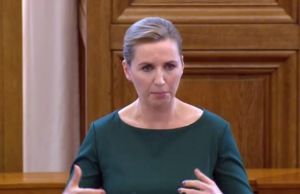News
Parliament opens in the shadow of COVID-19
This article is more than 5 years old.
Mette Frederiksen’s speech focused on the coronavirus, but also immigration, crime, the elderly, foreign affairs and the climate

Mette Frederiksen didn’t pull any punches (photo: screenshot)
The first Tuesday in October. That’s when Denmark’s Parliament opens for business every year. It is thus stipulated in the Danish constitution.
Today was no exception, although the ongoing Coronavirus Crisis did make it a bit different this year.
COVID-19 weighed heavy as Mette Frederiksen launched into a speech encouraging everyone to continue to be vigilant.
“There are many indicators that point to Denmark, as the situation is now, having control over the epidemic. But the health authorities evaluate that the figures are still too high as winter approaches,” Frederiksen said.
With Queen Margrethe and Crown Prince Frederik looking on, as tradition dictates, the PM revealed that the government would unveil a new coronavirus warning system that will provide more transparency about what actions will be taken should a spike occur.
READ ALSO: #MeToo in Christiansborg: Hundreds report cases of sexism in Danish politics
Times of corona
She also thanked the health workers in Denmark and everyone else working to keep the country going through the crisis.
“We have proven that we can protect individual lives and still be one of the economies to best get through the crisis,” the PM said.
The government will shortly be proposing far-reaching aid packages and leading a very expansive financial policy in 2021 and beyond.
However, she also said that many companies in Denmark will have to accept that running a business will be very different in the future.
Frederiksen also underlined that policies to tackle climate change was to be prioritised – an indicator of which was the recent sustainable agreement with India.
Thousands of jobs have been lost during the crisis and the PM said that an additional 5,000 study placements in further education will be available.
Among other things, it will help young people who have been forced to drop their sabbatical year due to the crisis to begin their further education.
READ ALSO: Denmark launching paradigm shift in foreign policy
Past immigration policy a failure
Frederiksen also had a stern word for the descendants of non-western immigrants, who are over-represented in the crime statistics.
The government will thus look at cracking down harder on criminal actions – including more hefty fines for breaching visitation laws, evicting people for breaking the law in certain areas, and confiscating personal effects from people who have committed crime and owe money to the state.
“The first time, the fine will be 10,000 kroner. And if you are in debt, the police will be able to confiscate jackets, watches and gold necklaces. The second time, it’s 30 days in prison,” Frederiksen said.
Denmark’s handling of immigrants in the past has been a failure, she said.
Furthermore, people with convictions for violence at nightspots will be handed a two-year curfew preventing them from visiting them.










































